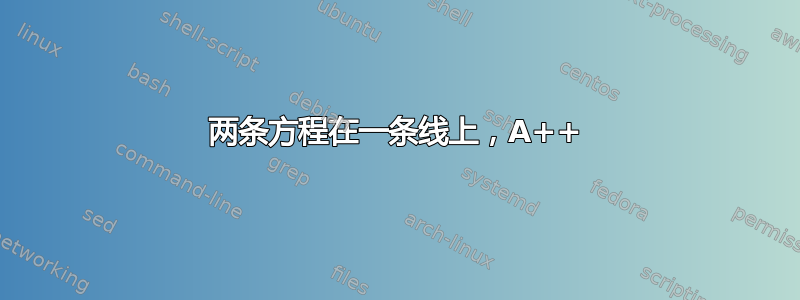
我有一篇被期刊接受的论文。这篇论文包含一个带有两个标签的方程式。我们使用期刊的样式文件对论文进行了排版,一切看起来都很完美。我们可以引用这两个标签,单击其中任何一个,我们就会转到显示的方程式。
但现在文字编辑说,如果我们在一行上有两个公式标签,那么在排版中在线的版本中我们只能获得其中一个标签的超链接。要么是第一个标签,要么是第二个标签。他们给出的原因是他们使用 A++ 来排版论文。我不确定 A++ 是什么,但我不明白为什么他们不能为两个方程标签提供超链接。
这是 MWE。对我有用,但对期刊没用。
\documentclass[10pt]{article}
\usepackage{empheq}
%\usepackage[latin1]{inputenc}
\usepackage[margin=3.0cm]{geometry}
\usepackage[pagebackref=false, colorlinks=true, linkcolor=blue, citecolor=blue, linkcolor=blue, anchorcolor=red, urlcolor=blue]{hyperref}
\makeatletter
\newcommand{\leqnomode}{\tagsleft@true}
\newcommand{\reqnomode}{\tagsleft@false}
\makeatother
\begin{document}
\begin{center}
\begin{minipage}{0.6\linewidth}
\leqnomode
\begin{equation}\label{primal}
\hspace{-3cm}
\begin{split}
\max & \,\, c^\top x \\ %C \bullet X \\
s.t. & \,\, A x \leq b \\
\end{split}\tag{P}
\end{equation}
\end{minipage}%
\begin{minipage}{0.5\linewidth}
\begin{equation}\label{dual}
\begin{split}
\min & \,\, b^T y \\
s.t. & \,\, A^\top y = c \\
& y \geq 0
\end{split}\tag{D}
\end{equation}
\end{minipage}
\end{center}
\newpage
Reference \eqref{primal} here. Reference \eqref{dual} here.
\end{document}
答案1
由于期刊的编辑人员已告知您,他们不能或不会采用您喜欢的方式来展示问题的原始和对偶公式,因此您别无选择,只能想出一种不同的方式来展示材料。
其中一种方法可能是将方程组放在一个两列表格中。例如,
\documentclass{article}
\usepackage{amsmath,booktabs}
\usepackage{threeparttable}
\usepackage[margin=3.0cm]{geometry}
\usepackage[pagebackref=false, colorlinks=true, allcolors=blue]{hyperref}
\begin{document}
\begin{table}[ht]
\centering
\begin{threeparttable}
\caption{Primal and dual formulations of a problem} \label{tab:p_d}
\medskip
\begin{tabular}{@{} c@{\qquad\qquad}c @{}}
Primal & Dual \\
\midrule
$\begin{aligned}[t]
\max\quad &c^\top\! x \\
\text{s.t.}\quad &Ax\le b
\end{aligned}$ &
$\begin{aligned}[t]
\min \quad &b^\top\! y \\
\text{s.t.}\quad &A^\top\! y = c \\
&y\ge 0
\end{aligned}$\\
\bottomrule
\end{tabular}
\end{threeparttable}
\end{table}
As is shown in the left-hand column of \autoref{tab:p_d}, \dots
\end{document}




